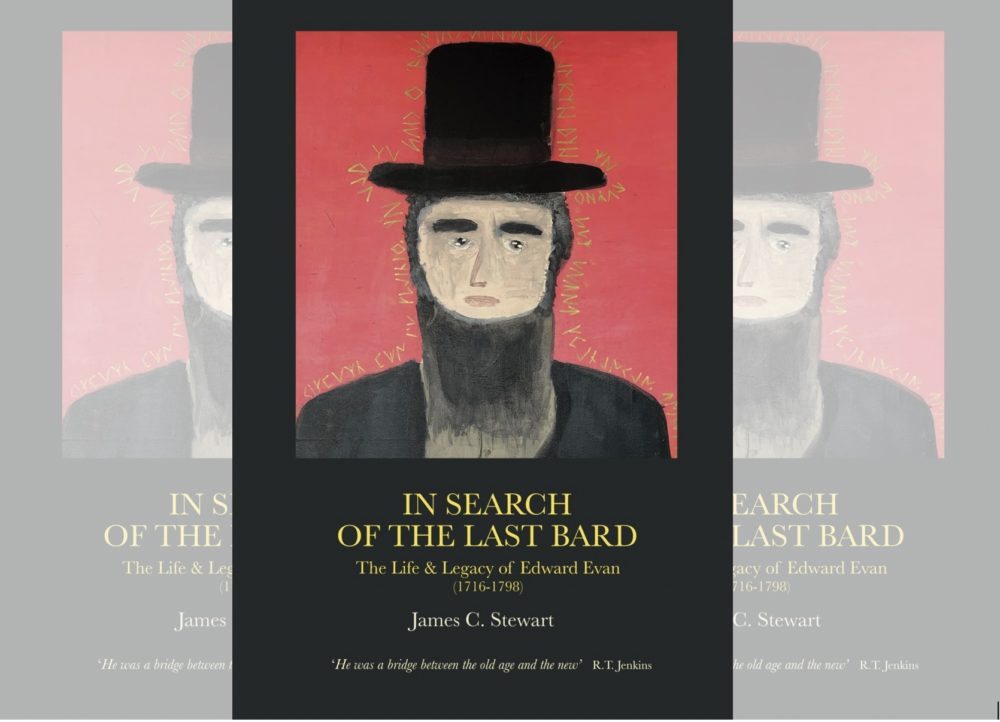Book review: In Search Of The Last Bard by James C. Stewart

Jon Gower
You get a lot more than biography in this account of the people’s poet Edward Evan, a man who was said to be the last druid standing, linking him with the bards of the distant past.
His friend Iolo Morganwg called him ‘a poet in a thousand’ but it’s sometimes hard to imagine where Evan found the time to pen verse at all, what with his being a weaver, harpist, carpenter, glazier, farmer, woodsman, bard and radical minister of religion.
In James C Stewart’s elegantly written and meticulously researched account of Evan’s life we also get a portrait of a tumultuous time in the south Wales valleys as rural, often remote communities were utterly transformed by the coming of coal, by the huge influx of people into what Gwyn Thomas called the “riven gulches” and the mutiplying railway connections to the wider world.
It was also a time of rapid change in politics, and in religion, too, fomenting social agitation at the same time as fermenting bold ideas in poetic minds such as Iolo Morganwg and his Glamorgan triban-composing chums. The Glamorgan triban was one of ‘the main glories of the popular literature of the Welsh nation’ but Evan soon found other treasures in which to delight, as he graduated to master more complicated forms of rhyme and chime.
Ancestor
One of the aspects of the book that makes it stand out for me, and makes it easily one of my books of the year – is the deft and often unexpected way in which it slides deftly from the past into the present, adding touches of psychogeography into the mix, reflecting the fact that Stewart is personally connected with this story, because Evan Evan was an ancestor of his.
So we find out about the contemporary harpist Rhodri Davies’ investigations of the delyn rawn, a harp strung with horsehair. It made a very gentle sound, could not sustain a note and was vulnerable to damp. Moreover Edward Evan might well have been one of the last harpists to play this instrument’s ‘shining black horsehair.’
Mountain Ash Golf Club
We explore the greens of Mountain Ash Golf Club to look for the place where Evan lived and hear the story of how the village derived its name from the rowan tree. And talking of ash, we find out how the industry of Evan’s valley contributed to the modern climate crisis.
The burning of coal mined in the Cynon Valley between 1844 and 1988 produced ‘almost 1,000 million tons of carbon dioxide – the equivalent of 120 years’ emissions from every home in modern Wales.’ It was a case of the rapacity of the industrial age poisoning the future as it were.
The author diverts us, taking us to consider Richard Wagner opera Die Meistersinger, in which the central character is a poet and harpist not unlike Edward Evan of Ton Coch. He’s very much on song at that point.
Revealing
Stewart is equally revealing about the name Ton Coch (‘the red meadow’) itself. While some have argued it derives from the burning effect of the hot sun on the grass ‘it seems more likely that the field next to the house, which gave the farm its name, grew the common Red Fescue, Peisgwellt Coch, “one of the most frequent grasses of unimproved meadows”, which certainly gives the field a striking russet colour when in seed.’ Here the journalist in Stewart comes to the fore, digging around, doing a bit of questioning.
Remarkable
In so doing he manages to present a vivid portrait of a remarkable man, whose poetry was so popular it was printed four times. Legends accreted around him, such as the one that suggested that he was “the man from Aberdare” who had preserved the priceless manuscript of the earliest poem ever written in Welsh, the Gododdin of Aneirin, which had gone missing sometime in the late eighteenth century.
We learn a great deal about the bards of Glamorgan who, in R.T.Jenkins’ words were not content to use Welsh ‘only for day-to-day communication but wanted to play with it and – at a higher level – took ‘itchy’ delight in the language in a literary way.’ These “Grammarians,” dedicated practitioners of the complexities of cynghanedd would study poetry much as they would glazing and carpentry and would hold their own eisteddfodau to inject an element of competition into the poetic proceedings.
A poet once prophesied that Edward Evan’s fame would live ‘as long as the meadows of Ton Coch bring forth clover and nourishment for man and beast.’ The clover’s long gone, replaced by the greens of the golf course. In the clubhouse, though there’s a Blue Plaque, unveiled this year to honour the bard and dissenting minister. This book helps ensure that the truth of the prophesy lives on just a little while longer.
In Search of the Last Bard by James C. Stewart is now available online and from all good bookshops.
Support our Nation today
For the price of a cup of coffee a month you can help us create an independent, not-for-profit, national news service for the people of Wales, by the people of Wales.





